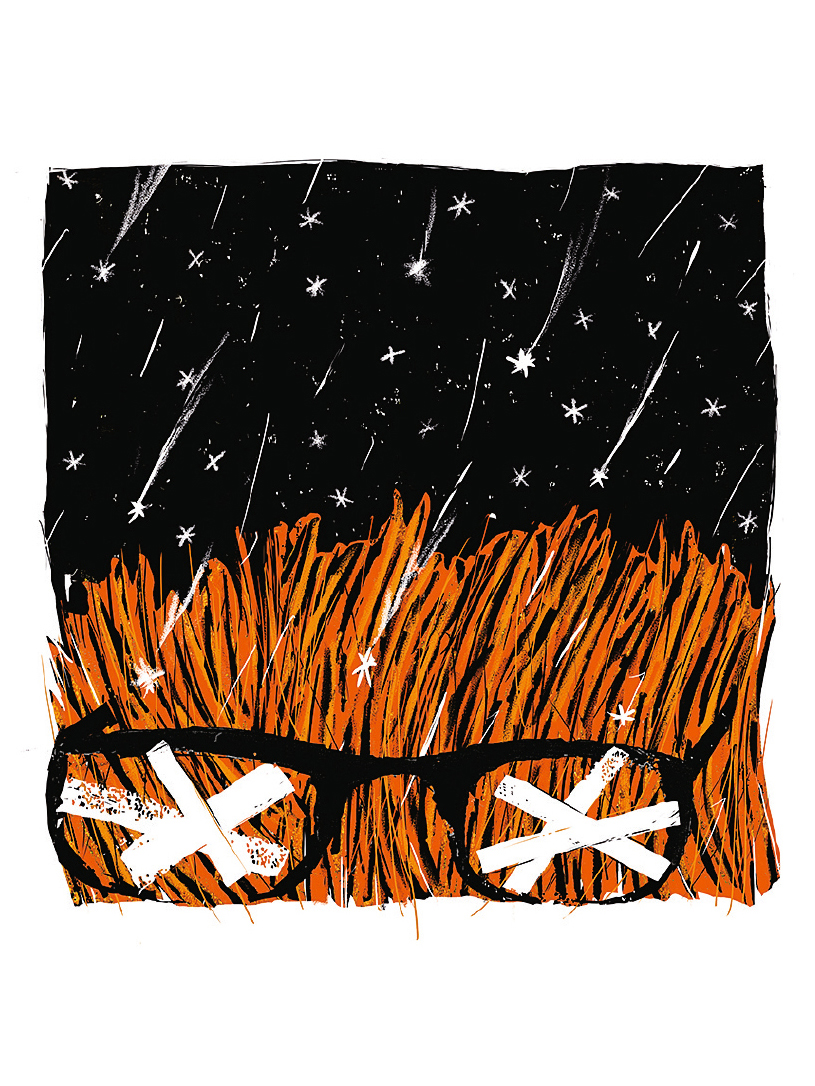Siarhiej Pryłucki – Нічога нястрашнага (Nothing unfrightening)
Illustration: Kaciaryna Pikirenia
Editor: Natalla Rusieckaja
Berlin, 2024
ISBN 978-3-949850-45-5
Language: Belarusian
Siarhiej Pryłucki was born in Brest in 1980. He is the author of the prose books “Йопыты двух маладых нелюдзяў” (“Experiences of Two Young Inhumans”,2009) and “Дэгенэратыўны слоўнік (“Degenerative Dictionary”, 2014). There are also the poetry collections “Дзевяностыя forever” (“The Nineties Forever”, 2008), “Герой эпохі стабільнасьці” (“Hero of the Era of Stability”, 2014), “Патрыятызм для чайнікаў” (“Patriotism for newbies”, 2016), “Далоў дарослых” (“Down with adults”, 2017), “Эўрыдыка не азіраецца” (“Euridice does not look back”, 2021), “Гіброіды” (“Hybroids”, prepared for publication). Lives in Ukraine.
“Daddy, sing me a lullaby…”
“Нічога нястрашнага” (“Nothing unfrightening”, 2024) is among the most sincere, piercing and painful books in our modern poetry. This is probably also the most piercing collection of poems by Siarhiej Pryłucki, Ukrainian citizen and Belarusian author.
Pryłucki has already written a very painful book that was enough to raise one’s hair: “Эўрыдыка не азіраецца” (“Eurydice does not look back”, 2021). But in that book, the Belarusian tragedy of suppressed uprising and brutal purges was seen from Bucha near Kyiv. Now Bucha itself has become the epicenter of pain. The catastrophic rift has literally passed through the poet’s own house, invaded by the occupiers. This rift has also passed through his wife and son, who had to go into exile, and through the heart of a poet who had to stay.
The book represents the nearly post-apocalyptic “on-the-spot report”. The author shows almost no defensive ironic distance, as he does elsewhere. The accustomed world has collapsed, and the narrator has lost most of his psychological support. Should he dance with a jacket that still smells of his wife? Should he write to his son about how his toys grow and mature instead of him? Such are the “phantom limb joys”.
Indeed, the first part of the book is the correspondence with Adam, the poet’s son. It is a very important part of this collection and another strong example of epistolary Belarusian poetry. This is probably a common symbol of our homelessness and dispersion in external and internal emigrations. But here there is also an autobiographical element, which other poets could not have.
The author is a mutable Proteus whose books are sensitive responses to the changes in the world around him. At the same time, he keeps the “core” of his worldview and the features of his poetic technique. Among such features, there is the sober prosaism that keeps the excessive pathos in check. Thus, the narrator holds back tears and offers his son to “draw an ass”. To his father’s delight, the son is growing up to be a hooligan.
Another recourse when one is drowning is a dialogue with one’s predecessors and contemporaries. One can discuss the Eastern music teacher or a grave in the air with Paul Celan. One can pick up “Interrupted Elegy” by Octavio Paz, mentioning “our dead”. Or, one can think with Aleś Razanaŭ about the future fate of one’s son – “a sower or a warrior”.
While the persona of the poems cleans up his home in Bucha after the Russian soldiers, the poet himself is trying to return to the world of language. Pryłucki cleans off meanings and intonations that turned into piles of dirt with the beginning of this war. He has no doubt about the victory. But he also has no doubt that evil will not go anywhere. After all, our children will have to clean up in the Belarusian and Ukrainian “home of being”. And we are responsible for those to whom we write letters.
Andrej Chadanovič

